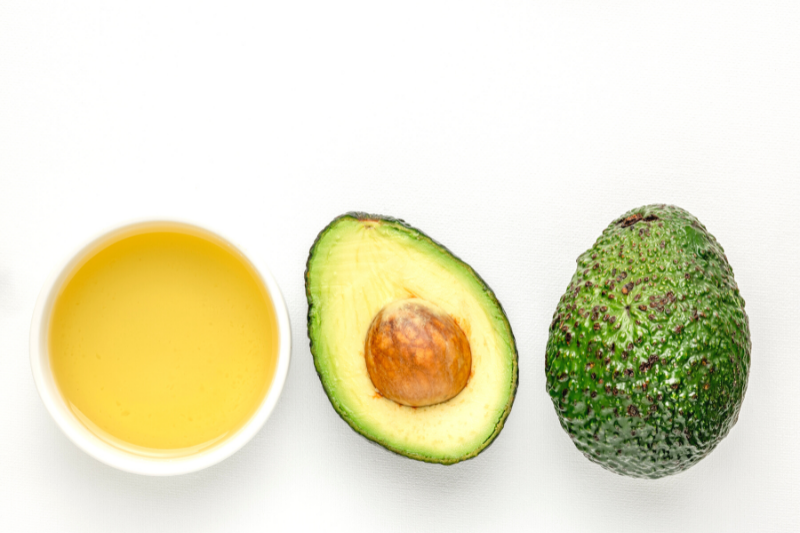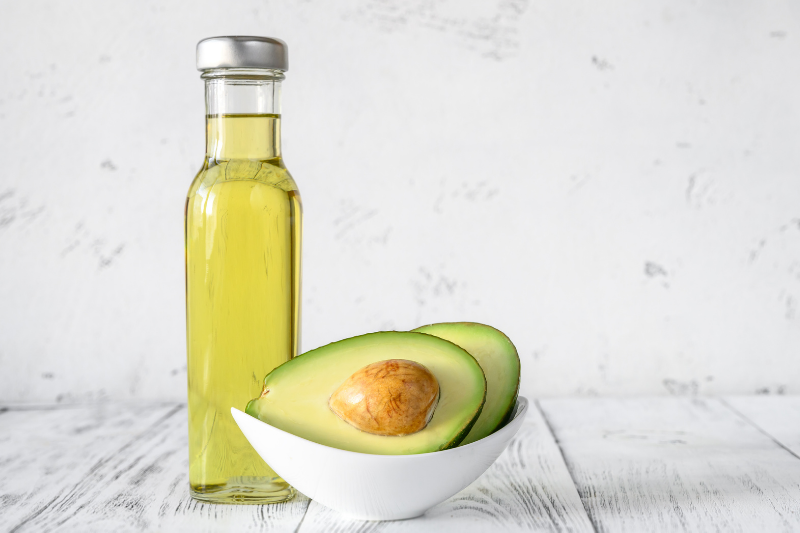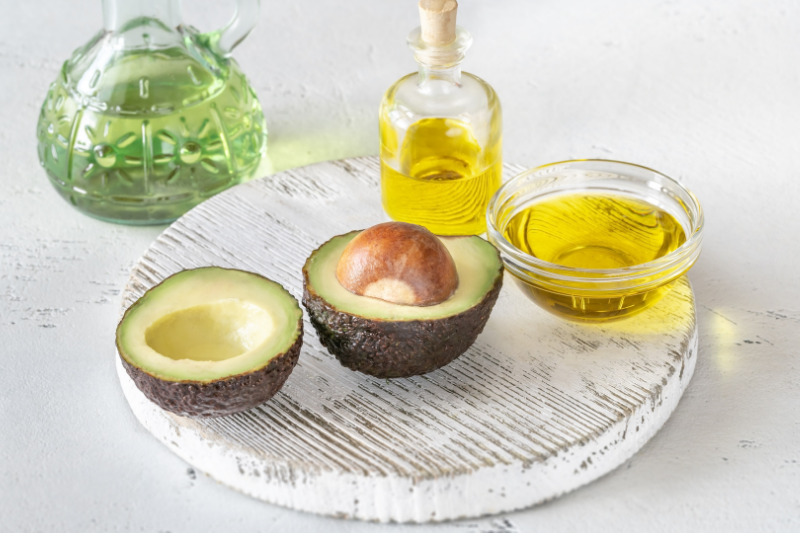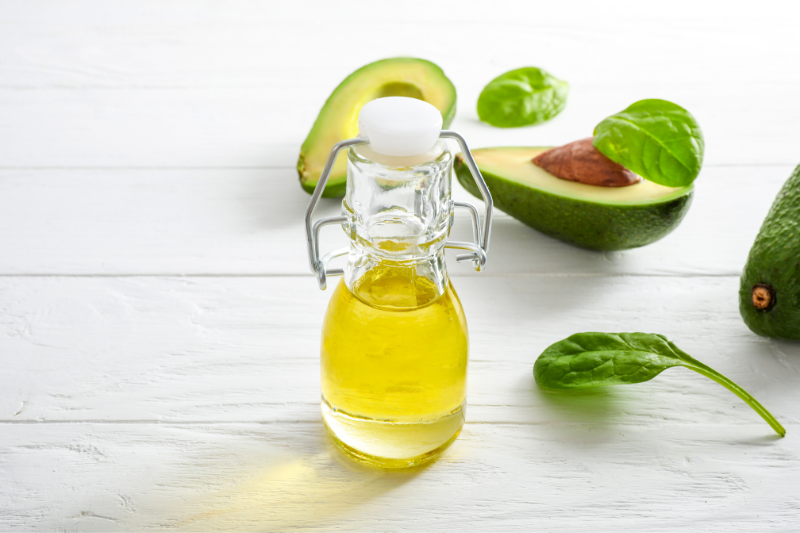If you have oily or acne-prone skin, you’ll want to know if avocado oil is comedogenic. Comedogenic ingredients clog the pores and can make your acne worse.
So, is avocado oil non-comedogenic or comedogenic?
Avocado oil is slightly comedogenic. It may worsen acne if you have oily skin. Yet, it works well for those with dry skin. Avocado oil can even help these skin types reduce their acne.
In this article, I’ll discuss what avocado oil is, its benefits in skincare, and who should/shouldn’t consider using avocado oil on their skin. Let’s get started!

What Is Avocado Oil?

Avocados are a versatile fruit, so it’s no wonder we love them so much. Avocados are healthy, so they’re great to add to your diet.
People love their avocados because they’re so flavorful. So, avocado oil is very common for use in cooking. It’s also a popular cooking oil because it’s safe to use at very hot temperatures.
Yes, you can eat avocados and avocado oil. But, you can use the oil in your hair and skincare routines as well.
Although avocados are a fruit, we refer to avocado oil as a “vegetable oil”.
We create most oils by pressing the seeds of the fruit or the nut. Yet, avocados are different. We press the fruit itself to extract the oil. This is because the avocado consists of 83% fat. So, using the oil is almost the same as using the fruit itself.
There are two kinds of avocado oil: refined and unrefined.
Refined VS Unrefined Avocado Oil
Unrefined avocado oil is the healthiest option for cooking and skin care. First, we press the flesh of the avocado, and then we spin the pulp. This separates the oil from the water and fruit flesh.
We make refined oil by filtering unrefined oil. This removes any pulp and impurities left in the oil. But, this process is less natural. As a result, it removes most of the oil’s color, flavor, aroma, and nutrients.
What Does Comedogenic Mean?
When something is comedogenic, it means that it’s likely to clog your pores. Comedogenic substances are bad news for people who have oily skin or acne problems.
If you already have issues with acne or oil, a comedogenic ingredient will only make things worse.
Acne occurs when your pores become clogged with dirt and bacteria. Those with naturally oily skin tend to have more problems with acne. Yet, acne can occur due to many things.
Using a comedogenic ingredient will make your acne worse.
There’s a scale that lists beauty products and their comedogenic rating. The comedogenic rating tells us how comedogenic something is.
The comedogenic scale rates ingredients on a scale of “0-5”. “0” is an entirely non-comedogenic ingredient. “5” is highly comedogenic.
To better visualize this, I’ve included a table that explains the comedogenic scale:
| # | Will It Clog Pores? |
| 0 | Does Not Clog Pores |
| 1 | Very Unlikely To Clog Pores |
| 2 | Moderately Unlikely To Clog Pores |
| 3 | Moderate Possibility Of Clogging Pores |
| 4 | Likely To Clog Pores |
| 5 | Very Likely To Clog Pores |
This scale makes it easy for people to see if they can use a certain ingredient. Those with oily or acne-prone skin should avoid any rating above “2”. Those with normal or dry skin are usually safe to use any ingredient regardless of its rating.
With the internet at your fingertips, it’s not hard to find out what is comedogenic. Still, I’ve included a short list of comedogenic ingredients.
These are the ingredients that you should always avoid if you deal with oily or acne-prone skin:
- Carrot Seed Oil
- Cocoa Butter
- Coconut Oil
- Flaxseed Oil
- Oleic Acid
- Palm Oil
- Soybean Oil
- Wheat Germ Oil
Is Avocado Oil Comedogenic? Does Avacado Oil Clog Pores?

Now you know what “comedogenic” means. So, you’re probably wondering, is avocado oil comedogenic?
Avocado Oil Comedogenic Rating
The truth is that avocado has a comedogenic rating of “2”. This means that it’s somewhat likely to clog pores. So, if you have oily or acne-prone skin, it’s better to avoid avocado oil. There are other products, like castor oil, which are completely non-comedogenic.
Avocado oil is so comedogenic because it contains high amounts of Oleic acid. Oleic acid is very comedogenic and makes up 65% of avocado oil.
Those with oily, acne-prone skin should definitely avoid avocado oil.
Yet, avocado oil is only slightly comedogenic. So, if you have dry, acne-prone skin, you may be able to get away with using avocado oil. Use caution and watch how your skin reacts to the new product.
The reason that it might help dry, acne-prone skin is that it’s hydrating and cleansing. It’ll add much-needed moisture to your thirsty skin.
It’s also known to reduce pore size, reducing the risk of debris clogging your pores. It can also remove impurities from the skin. So, it may rid your skin of acne-causing bacteria and dirt.
Does Avocado Oil Clear Acne?
Avocado oil only has a comedogenic rating of “2”. This means that we consider it “non-comedogenic”.
Those with oily skin might find that avocado oil can make their acne worse. Yet, those with dry skin may enjoy avocado oil. Research has shown that avocado oil can be effective in treating acne.
Avocado Oil Is Rich In Vitamin E
One of the main reasons avocado oil is so great is that it contains E vitamins.
Vitamin E is an effective antioxidant that fights free radicals. Free radicals are the elements that cause damage to skin cells. So, avocado oil can prevent skin damage before it ever happens.
Vitamin E is also great for fighting off inflammation. Inflammation is common with any kind of wound. Everyone who deals with acne will experience painful inflammation. As your pores become infected with bacteria, your skin will swell.
Inflammation-fighting Vitamin E reduces the pain, irritation, and redness associated with acne-caused inflammation.
Avocado Oil Is Rich In Fatty Acids
Another key component of avocado oil is its fatty acids. It is rich in fatty acids like omega-6 and omega 3-which also help to reduce inflammation. Besides that, the fatty acids are what help the skin keep moisture and stay hydrated for longer.
Eating Avocado Oil Can Help Your Skin
What we eat can affect our skin. Eating unhealthy foods may be the reason behind your acne.
Avocado oil is healthy. When you use it in your cooking, it may impact your skin from the inside out.
Should You Use Avacado Oil On Your Skin?
If you have oily skin, you should avoid avocado oil because it’s likely to clog your pores.
Yet, if you have normal or dry skin, avocado oil is likely to work wonders on your skin.
Avocado oil is likely to prevent and treat your acne. Still, that’s not all it’s good for. People also love avocado oil because it’s moisturizing, protective, and healing.
Avocado Oil Is A Protective Moisturizer
Avocado oil has vitamin E, potassium, lecithin, and many other nutrients that moisturize. The outer layer of the skin is easily able to absorb these nutrients.
When your skin receives the proper nutrients, it’s going to hydrate easier. Hydration keeps skin cells healthy and prevents damage.
Avocado Oil Relieves Irritation
I mentioned earlier that avocado oil can relieve inflammation. Besides acne, this trait can help with skin conditions like eczema and psoriasis.
It can also relieve irritation caused by these conditions. Itching and flaking will begin to go away with the use of avocado oil.
Avocado Oil Speeds Up Healing
The fatty acids in avocado oil promote the creation of collagen. Collagin is the main protein found in the skin.
Since avocado oil creates collagen, it can promote the healing of damaged skin cells. It can also promote the creation of new skin cells to replace damaged cells.
As mentioned, avocado oil reduces inflammation. Without inflammation, skin cells will heal faster.

Avocado Oil Relieves The Signs Of Aging
Aging skin is natural, but it can be frustrating. Our environment can also cause premature aging of the skin. The antioxidants in avocado oil can prevent this.
Antioxidants fight free radicals. These are the elements that are responsible for damaged skin cells. Damaged skin cells lead to signs of aging like wrinkles and sagging.
The essential fatty acids in avocado oil are also thought to help the skin keep its elasticity. As we age, our skin loses its elasticity. This contributes to wrinkles and sagging.
With avocado oil, our skin keeps most of its elasticity. So, it should keep your skin looking younger for longer.
Avocado Oil Can Help With Sunburns
Likewise, antioxidants and fatty acids can help with sunburns. Avocado oil contains Vitamin E, beta carotene, vitamin D, lecithin, and proteins. These elements help sunburned skin heal. It can also relieve the pain resulting from sunburn.
Limited research even shows that avocado oil may act as a mild sun protectant.
Avocado Oil Can Treat Dandruff
Dandruff occurs on the scalp, and it can be very irritating. Since avocado oil is moisturizing and healing, it can treat dandruff. Rubbing a bit of avocado oil into your scalp can help with dryness, flakiness, and itchiness.
Conclusion
Avocado oil is slightly comedogenic, but in most cases, it’s not likely to clog your pores. But, if you have oily skin, you should avoid avocado oil. The oil works against oily skin to cause more acne.
Still, those with normal or dry skin are unlikely to have problems with their pores. Contrarily, avocado oil will moisturize skin and may clear the skin of acne.
Discover if avocado oil is great for weight loss here, exactly how to store avocado oil here, if it’s a good carrier oil here, how to use avocado oil for lips, acne, stretch marks, scalp or how long it lasts here. Also find out how avocado oil is compared to canola oil here. Check out more avocado guides here.

![Is Avocado Oil Comedogenic? Does It Clog Pores? [Full Guide] avocado oil](https://eatquickhealthy.com/wp-content/uploads/2022/05/avocado-oil-768x512.png)
Comments are closed.